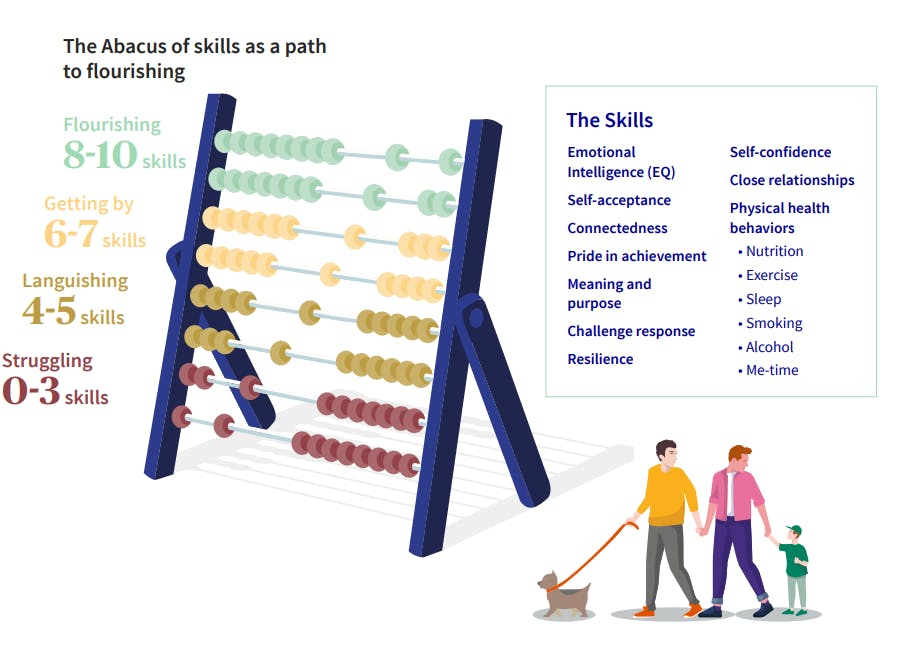
January 25, 2022
AXA’s Mind Health Index
AXA has developed a Mind Health Index to help assess mental wellbeing, identifying potential problems before they become serious and showing people how to lead more fulfilling lives. AXA wants to be a positive force for human progress, empowering people to overcome obstacles – both mental and physical – by taking positive action, such as being physically active, socializing more or being more accepting of their own faults or limitations.
3 minutes
Being mind-healthy: Why good mind health is key to our social and financial wellbeing
This article is part of the AXA Study of Mind Health and Wellbeing in Europe and Asia 2022.
ACCESS THE FULL STUDYAXA’s Mind Health Index has been developed in response to growing public awareness of mental health issues and their impact on physical wellbeing. This trend has been accelerated by the pandemic and the mental pressures that come with it. Aside from the obvious risk of contracting COVID-19, people have faced increased isolation from family and friends, job losses – either temporary or permanent – and their consequent financial impact, to name but a few.
Alongside public awareness is a willingness to self-diagnose, particularly via the internet. In our study, just under a quarter of those who said they are currently experiencing mental illness had diagnosed themselves. This points to strong potential demand for online health tools, especially in areas where good public healthcare services are lacking.
The pandemic has encouraged people to talk about how they feel, breaking down stigma and social taboos that often caused them to clam up in the past, making mental ill health harder to diagnose and treat. As a result, people generally are now keener to seek help when problems arise.
Lifestyle choices
AXA’s Mind Health Index begins by assessing people’s current wellbeing according to how positive or negative they feel and what impact the world around them is having on their state of mind. It then looks at possible actions, and the lifestyle choices people can make to improve their mind health. This can include diet, sleep and how they interact with others, along with less tangible factors such as self-confidence and self-awareness.
It also looks at wellbeing modifiers. These are elements that people have less control over, such as current or previous mental health conditions, public mental health service provision or the trust they have in relationships with friends, family and colleagues.
By using this information, respondents may be divided into four categories, ranging from struggling at the bottom, through languishing and getting by to flourishing at the top. Those considered to be struggling rate poorly for wellbeing in most areas. People who are languishing aren’t functioning at full capacity, leaving them feeling unmotivated and struggling to focus. Getting by denotes those who may score well in some crucial areas, but not enough to say they are truly flourishing. Flourishing is the pinnacle of good mind health – flourishers are comfortable with who they are, their strengths and their weaknesses.
People profiles
To illustrate our study, we’ve put together four profiles – these do not relate to real people for reasons of confidentiality, but they are based on real responses and provide an insight into the human dimension of our 2022 Mind Health and Wellbeing Study.
EXPLORE THE PEOPLE PROFILESHow to flourish – the AXA Abacus
AXA’s Mind Health Study aims to answer the question of what is needed to help people who are struggling, languishing or getting by to push upwards to the peak of mental wellbeing and flourish.

The Abacus is an illustration of the skills that are essential to completing that journey. These include developing close relationships, resilience and selfacceptance – a skill that many of us have to work hard to achieve. By improving in these areas people who may be struggling currently can move up to languishing or getting by. To reach flourishing, our research suggests they need to have at least eight of these 10 skills.
What the Mind Health Study shows, however, is that some skills are more important than others in helping people to improve their mental wellbeing. Selfacceptance is perhaps the most important – and key to the idea of flourishing, assisted by a sense of achievement and purpose, social connection and selfawareness. These are less tangible than the skills that characterize people who are getting by, languishing or struggling. They are based instead on high levels of conviction and contentment. Those who achieve self-acceptance are comfortable with who they are and understand their own strengths and weaknesses.
From a practical point of view, the Abacus provides a way of identifying where effort should be focused to support people’s mind health. An individual’s mind health category is associated with how many of the 10 skills they have and how strong they are in each. Any of these can be improved over time – by taking positive action or by changes in an individual’s external environment.





